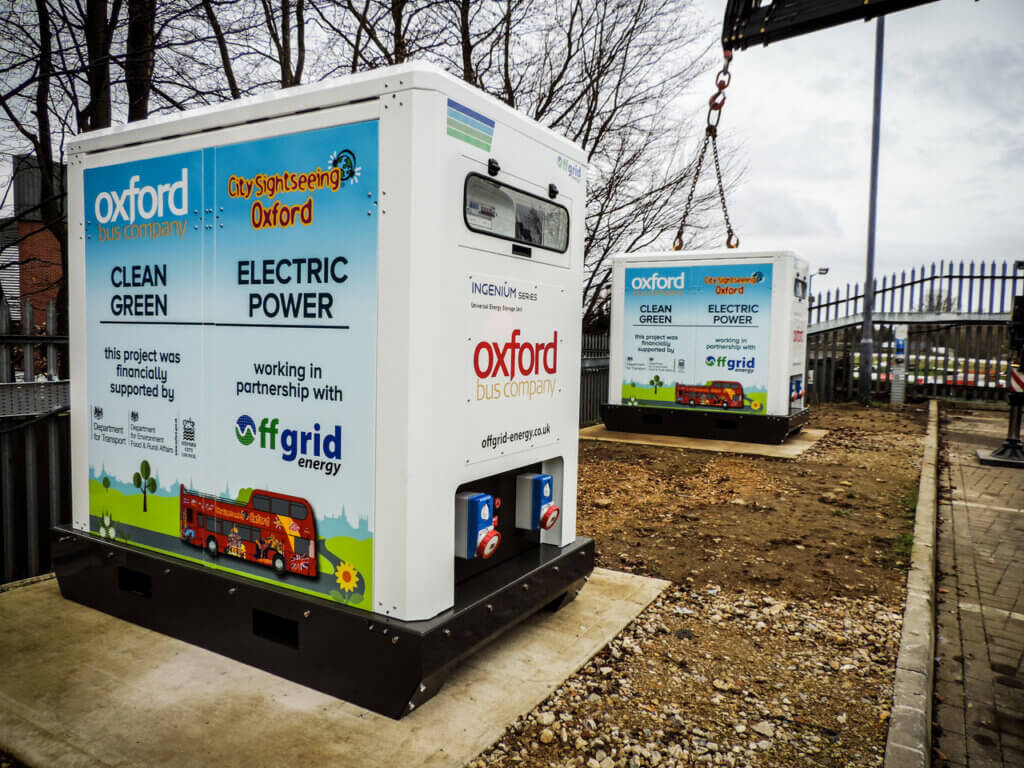Oxford Bus Company Cowley Depot
How can batteries and energy storage operate in a flexible system?
The batteries at Oxford Bus Company’s Cowley Depot were utilised in trials to better understand how energy storage can benefit, and operate within, a local flexibility market.
Background
The Oxford Bus Company (OBC) operates a fleet of 160 buses and coaches with the lowest emissions for its size in the UK, with roughly half being electric-hybrid buses. In 2013, Low Carbon Hub installed a photovoltaic (PV) array on the roof of OBC’s Cowley depot, which they own and operate.
Low Carbon Hub sell the electricity from the array to OBC so that they can benefit from low cost renewable electricity without having paid towards the installation of the panels. OBC have since installed two batteries at its Cowley Depot which are able to facilitate the charging of their increasingly electrified fleet of buses. Together, the renewable energy provided via the PV array combined with storage through the batteries, provided a great opportunity to trial and examine electricity storage in a local flexibility market.
Key facts
- 140 kWp photovoltaic array
- Two 24 kW 90 kWh batteries
- One substation to measure and monitor energy
- Multiple flexibility market participants

Aim of the trial
In a local flexibility market, there could be multiple platforms under which a flexibility provider could provide support to the energy system. However, in order for a flexibility market to function effectively and efficiently, it is important that these different platforms are coordinated and in-sync. We ran MVS trials with the OBC’s batteries, testing how flexibility can be provided across multiple platforms and with multiple dispatch communications.
A Minimum Viable System is the minimum set of participants, technologies and practices required to test a new process, service, or asset. Referred to as MVS trials, our experiments help us to explore how effectively flexibility services can be delivered and highlight the benefits these provide to the network and the trial participants and wider community.
The MVS process allows us to test the flexibility services in a step-by-step fashion, helping us to thoroughly understand what does and doesn’t work well. We can then review the process, ironing out the bugs before rolling out flexibility service participation to a wider audience.
What we did and what we learnt
The trials provided a great opportunity to test multiple market platforms and dispatch communications for providing flexibility. Additionally, through the use of the substation, the amount of flexibility could be also be measured at different locations, providing greater clarity of what level of monitoring is needed once flexibility is available throughout Oxfordshire.
In normal operation, the two batteries are non-controllable, so Low Carbon Hub worked with the battery manufacturers (OffGrid Energy) to reprogramme the batteries and allow their remote control for the purposes of the trials.Two trials were run using the batteries and the platforms at the end of 2019. The trials, which were for the first sets of trials undertaken as part of Project LEO, tested delivering -30 kW of flexibility (roughly equivalent to the same output as domestic boiler) for one hour. Both trials were successful, helping to identify minor bugs in the platforms (which have since been fixed), and provided a more detailed understanding of how flexibility offerings are felt at different locations throughout the grid.
Who is involved?
The Oxford Bus Company, Low Carbon Hub, OffGrid Energy, Piclo, and SSEN.
